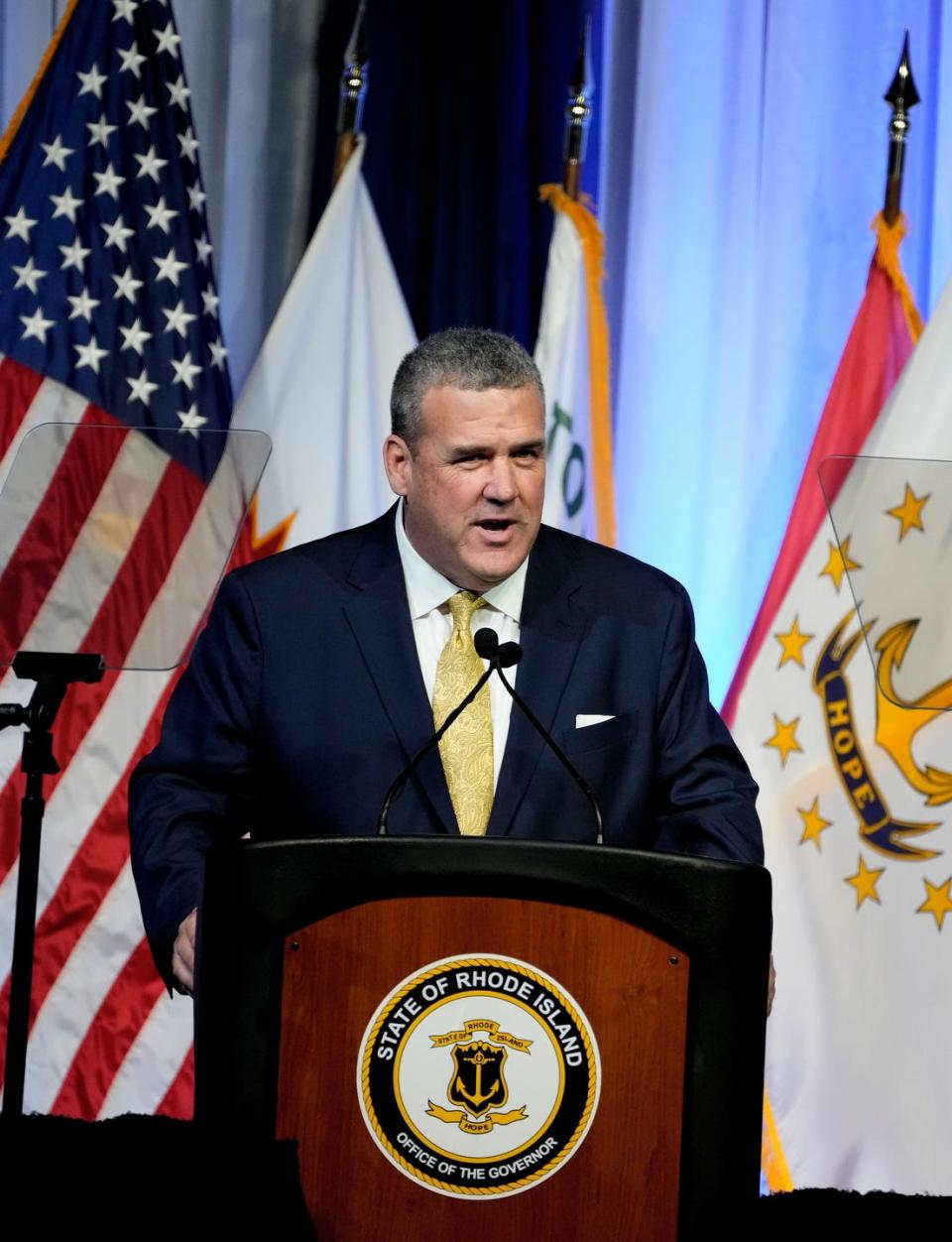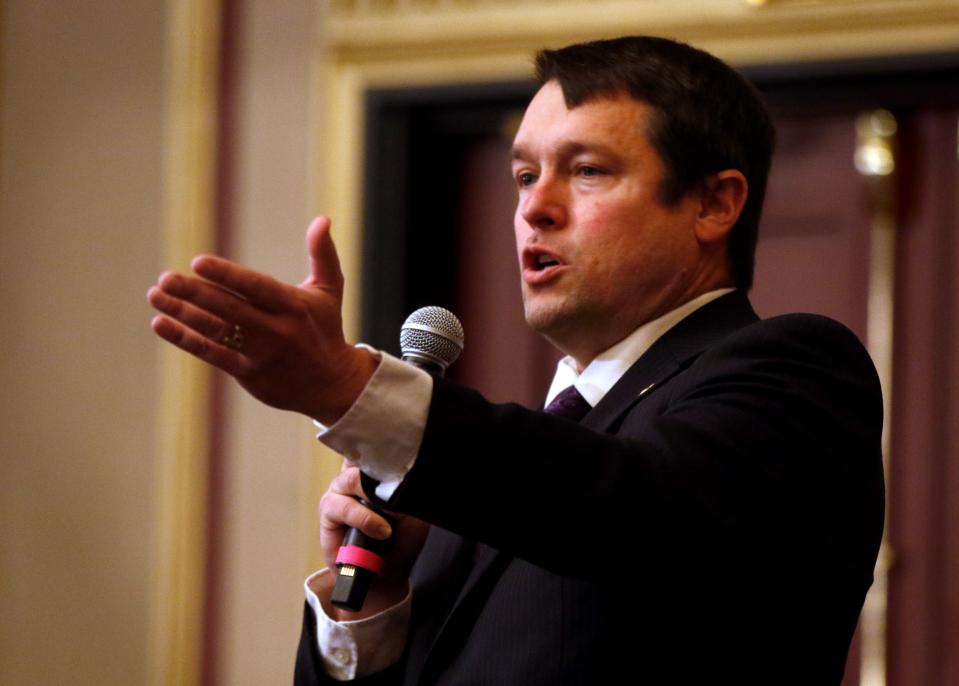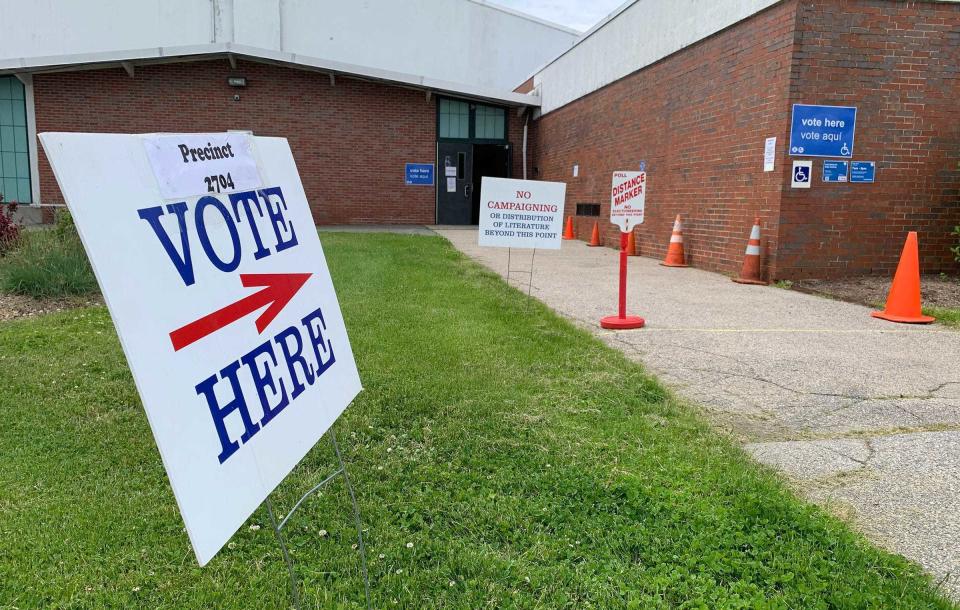Untangling the potential changes to RI elections, from ranked-choice to moving primaries
- Oops!Something went wrong.Please try again later.
There has been a steady stream of changes to how Rhode Islanders vote in recent years, from early voting 20 days before Election Day to using ballot drop-boxes and being able to vote by mail without witnesses standing by.
The changes almost certainly won't stop. At least 65 election-related bills have been filed in the General Assembly this year already, including proposals to allow same-day voter registration, ranked-choice voting and a whole new state elections calendar.
At least one change is effectively mandated this year.
The Rhode Island law that sets the special election calendar clashes with federal rules for providing absentee ballots to overseas service members in a timely manner.
So with U.S. Rep. David Cicilline's impending resignation triggering a special election, state election officials hashing out special primary and general election dates are looking at legislative action.
Whatever they do could collide with long-running proposals to move up the primary dates — to before Labor Day — for Rhode Island's biennial regular state elections.
Moving the regular primary date up is among six election bills backed by new Secretary of State Gregg Amore, including same-day voter registration.

And the Board of Elections has its own package of bills focused primarily on the procedural side of voting.
Here's some of what you need to know about potential election changes this year:
More on election changes:From Voter ID to residency minimum: These bills could change elections in RI. Here's how.
When will the congressional special election be?
The special election to replace Cicilline will be the first congressional special election in Rhode Island since 1967, when U.S. Rep. John Fogarty died of a heart attack.
Since then, Congress passed the MOVE Act in 2009, which requires states to send out absentee ballots at least 45 days before any election, including primaries, general and special elections.
Rhode Island law mandates that candidates declare for special elections on the 39th to the 40th day before the primary, after the 45-day MOVE Act deadline to send out absentee ballots has already passed. That's been moot for years because there haven't been any special elections.
Earlier this month, the Board of Elections endorsed legislation to have candidates declare on the 67th and 68th days before a special election for federal office, allowing plenty of time to meet the federal deadline. (The deadline for those candidates to submit nomination signatures would also be moved up.)
More:House Speaker Shekarchi won't run for CD1. Now, who will toss their hat in?
Amore supports the change.
Pushing forward the deadline to declare would make it possible to hold the special primary on Aug. 8, one of the dates that has been floated, along with Sept. 5. (Amore's office on Thursday said other dates are still in play.)
It would also mean 1st Congressional District candidates might have to declare for the race in early June, while the General Assembly is in the thick of the legislative session.
Will regular elections move to August?
Rhode Island's regular statewide elections often come close to violating the MOVE Act, but so far proposals to move them up haven't gotten traction at the State House.
Rhode Islanders are usually at the beach, on a boat, or quahogging in July and August, critics of moving elections up point out.
In a "perfect world" Amore says he would move state primaries to June, but without popular support for that yet he is backing a bill introduced by Pawtucket Democratic Rep. Karen Alzate that would move the primary from early September to the last Tuesday in August.
"We are up against the requirement of the MOVE Act to make sure we mail out overseas ballots 45 days prior to the election," Amore told the House State Government and Elections Committee. "If we were to have a disputed election or recounts, a delay of three or four days, we would not be able to get those ballots to our overseas voters and would be under Department of Justice sanction ... This would give us some breathing room."
North Smithfield Republican Rep. Brian Newberry pointed out that pushing the candidate signature gathering process earlier into the General Assembly's hectic June "is a disadvantage to incumbents."

"I am not here to shill for incumbents," he said. "We will just have to pass more bills before the budget bill, which is not a bad idea."
Rep. Jon Brien, independent of Woonsocket, said that "My experience is people are checked out from politics and the electoral process in the summer."
There is more concern with vacations and barbecues and summer events. Peoples' heads kind of get turned around after Labor Day."
The Board of Elections is slated on Tuesday to take a position on moving the primary to the last week in August.

Will there be ranked choice voting in the next vote for president?
What does the former speaker of the Colorado House of Representatives have to do with Rhode Island election bills — and Reese's Peanut Butter Cups?
They are all part of an effort to convince Rhode Islanders to use ranked choice voting when they cast a ballot for president next year.
"One of the benefits of ranked choice voting in presidential primaries is there is no wasted vote," Terrance Carroll, the former Colorado speaker told the Rhode Island House Elections Committee.
"Everyone has their voice fully heard."
Carroll had come to Rhode Island on behalf of FairVote, one of two national organizations advocating for ranked choice voting in the Ocean State's presidential primary.
The other group is Article IV, which has hired two high-powered Rhode Island lobbying firms on $5,000-per month contracts to push for ranked-choice voting in the presidential primary: Wallace Gernt's Bradford Group and Erich Haslehurst's Statecraft Strategies.
Former presidential and New York City mayoral candidate Andrew Yang is on FairVote's board.
There isn't much public information available on Article IV. It is based in Lubbock, Texas, according to GuideStar.
It is unclear who its funders or board members are.
Last month, the sponsors of the ranked choice voting bill, Rep. Rebecca Kislak and Sen. Valarie Lawson, held a Valentine's Day ranked-choice favorite candy vote at the State House. Reese's Peanut Butter cups won an immediate majority, negating the need for voters' second choices to come into play.
The argument for ranked-choice in the presidential primary over state elections: Because Rhode Island's presidential primaries are late in the process, many of the candidates who make the ballot here are already out of the race by the time the vote arrives. By using a voter's second and third choices to determine the winner, ranked choice means a vote won't be wasted if the first choice candidate has dropped out, proponents argue.
Because the change would only involve party primaries, ranked choice supporters say it would not require voters to back a constitutional amendment.
It could also serve as proof of concept for proponents of using ranked choice in state primaries.
Common Cause Rhode Island supports using ranked choice for the presidential primary.
Record number of bills
You may have heard lawmakers or House Speaker K. Joseph Shekarchi mention, as they work through a particularly long committee calendar, that colleagues are filing a record number of bills this year.
And it's true.
There were 1,128 bills introduced in the House by the March 2 filing deadline this year.
Last year there were 1,040 filed by the same period; in 2021 there were 1,110; in 2020 there were 948, according to figures from House spokesman Larry Berman.
(Bills can still be filed after the deadline, but need leadership permission.)
Exactly why bill inflation is happening is not obvious.
But whatever the reason, it is leading to more of the 30-committee calendars like the March 8 Elections Committee agenda.
This article originally appeared on The Providence Journal: RI elections: Ranked-choice voting, moving primaries, same-day registration proposed

